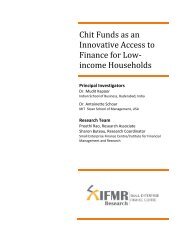Government of India Volume I: Analysis and Recommendations
Government of India Volume I: Analysis and Recommendations
Government of India Volume I: Analysis and Recommendations
Create successful ePaper yourself
Turn your PDF publications into a flip-book with our unique Google optimized e-Paper software.
FOUNDATIONS OF CONTRACTS AND PROPERTY<br />
6. Storage <strong>of</strong> transaction data: The last financial crisis has highlighted the interconnected<br />
nature <strong>of</strong> finance. When a financial market player fails, the unmet obligations<br />
to other parties may spread risk across the financial system. While it is not<br />
possible to move all transactions to an exchange, trade repositories for OTC transactions<br />
have become an important infrastructure system to monitor risks during<br />
normal times <strong>and</strong> improve interventions in times <strong>of</strong> emergency.<br />
The Commission recommends that the <strong>Government</strong> be provided with the power to<br />
add more services to the list <strong>of</strong> Infrastructure Institutions.<br />
13.4. Regulatory issues <strong>of</strong> Infrastructure Institutions<br />
The Commission found that the regulation <strong>of</strong> Infrastructure Institutions requires the regulator<br />
to address the following six primary issues about their functioning.<br />
1. An Infrastructure Institution must be governed in a manner which is compliant with the principles<br />
<strong>of</strong> prudential regulation;<br />
2. An Infrastructure Institution must also protect the interests <strong>of</strong> the persons using its services in<br />
compliance with the principles <strong>of</strong> consumer protection;<br />
3. Infrastructure Institutions are usually systemically important as they connect other financial service<br />
providers <strong>and</strong> therefore systemic risk concerns require to be addressed;<br />
4. Infrastructure Institutions sometimes enjoy considerable market influence as they provide ‘infrastructure’<br />
services to all players <strong>and</strong> this requires the regulator to ensure that this market influence<br />
is not used to discriminate between users;<br />
5. Certain Infrastructure Institutions produce information which is used by the larger economy. The<br />
release <strong>and</strong> integrity <strong>of</strong> the information needs to be maintained;<br />
6. Certain Infrastructure Institutions should be obliged to track market abuse <strong>and</strong> enforce against<br />
it, without diluting the requirement upon the regulator for this purpose.<br />
The Commission recommends that Infrastructure Institutions be obliged to pursue<br />
these six objectives alongside the regulators. Regulators must have oversight over this<br />
rule-making process <strong>and</strong> ensure that rules are made by Infrastructure Institutions that<br />
are consonant with the above six objectives <strong>of</strong> regulators.<br />
13.4.1. Prudential regulation<br />
The general micro-prudential law m<strong>and</strong>ates the regulator to monitor the promises made<br />
by financial firms in the securities sector. The Infrastructure Institutions make important<br />
promises to the consumers like delivering securities at an agreed price, keeping record <strong>of</strong><br />
ownership, transferring money for financial <strong>and</strong> non-financial activities <strong>and</strong> extinguishing<br />
claims. The failure to keep these promises will have repercussions upon consumers<br />
<strong>and</strong> the financial system at large. Hence, regulators must enforce prudential regulation<br />
requirements upon Infrastructure Institutions.<br />
13.4.2. Consumer protection law<br />
While Infrastructure Institutions may themselves not directly deal with consumers, financial<br />
service providers usually act as intermediaries between such institutions <strong>and</strong> retail<br />
consumers. This requires that regulators ensure that Infrastructure Institutions apply the<br />
principles <strong>of</strong> consumer protection law. These principles will operate in a number <strong>of</strong> ways<br />
to protect the interests <strong>of</strong> the consumer:<br />
1. It will require the market design, that is embedded in the rules created by Infrastructure Institutions,<br />
to be fair to consumers;<br />
2. It will require securities advisors to judge the appropriateness <strong>of</strong> the security to the needs <strong>of</strong> the<br />
retail consumer; <strong>and</strong><br />
FINANCIAL SECTOR LEGISLATIVE REFORMS COMMISSION 123



